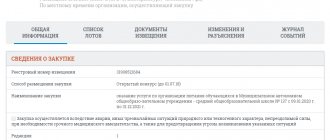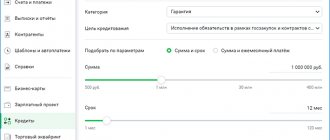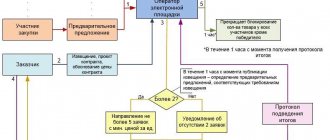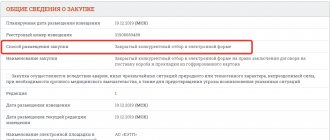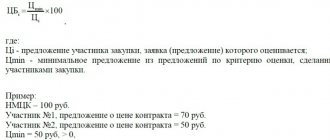Home / Government procurement / Federal Law 223
Back
Published: 09.09.2018
Reading time: 8 min
0
682
Federal Law “On the procurement of goods, works, services by certain types of legal entities” dated July 18, 2011 N223-FZ, in contrast to the federal law “On the contract system in the field of procurement of goods, works, services to meet state and municipal needs” dated April 05, 2013 N44-FZ does not define a clear procurement procedure, but only establishes general principles and rules for their conduct.
- General provisions of federal law 223-FZ
- Types of procurement procedures
- Planning and regulation of procurement
- Reporting
- Control and responsibility in procurement
Structure
Federal Law 223-FZ regulates the procurement procedure for legal entities, state corporations, companies and other large market entities.
The law contains 20 articles and has the following structure:
- Articles 1–3 are the basic provisions of 223-FZ: they define the goals, objectives, principles and foundations of the legal regulation of this law;
- Articles 3.1–3.1–3 regulate the specifics of certain types of procurement, for example, for the purpose of creating architecture or providing rental services;
- Articles 3.2–3.5 regulate the process of competitive procurement: procedure, features, requirements and implementation in electronic form;
- Article 3.6 determines the procedure for purchasing from a single supplier;
- Articles 4–5.1 regulate issues related to information support for procurement, including entering information about its implementation and dishonest fulfillment of obligations by the supplier and monitoring the compliance of procurement plans with the legislation of the Russian Federation;
- Articles 6–7 define the process of monitoring directly compliance with the requirements of 223-FZ by all parties to procurement activities, as well as responsibility for violation of the provisions of this law;
- Article 8 regulates the entry into force of 223-FZ.
The main goal of 223-FZ is to create a single sustainable economic space and ensure efficient spending of funds by state corporations, natural monopolies and other major procurement participants, as well as their subsidiaries.
223-FZ establishes the following procurement principles:
- information openness;
- equality;
- efficiency, focus and economy in spending funds;
- non-obstruction of access to participation in procurement by establishing non-measurable requirements.
What types of tenders are there?
Tenders are divided into 3 types: state (according to 44-FZ), corporate (according to 223-FZ) and commercial .
It is better for a novice participant to start with government tenders (government procurement). This has several advantages. Strict conditions apply here, requirements for participants are collected in a standard list, payment terms for the fulfillment of obligations are determined, and a standard set of information and documents that must be provided in your application is determined. All this greatly simplifies the participation procedure.
After gaining experience in procurement under 44-FZ, you can try your hand at tenders under 223-FZ or commercial tenders. It is not recommended to start with them due to the complexity of the procedures. It will take time to understand them and a certain skill that is acquired during participation in procurement under 44-FZ (state).
Depending on the nature of the tenders, there are competitive and non-competitive . Competitive include :
- Competition (open competition, competition with limited participation, two-stage competition, closed competition, closed competition with limited participation, closed two-stage competition).
- Electronic auction.
- Request for quotations is the simplest and fastest procurement procedure.
- Request for proposals.
All of these procedures are called competitive. Non -competitive purchases include purchases from a single supplier; they are carried out in accordance with the provisions of Art. 93 44-FZ.
Tenders can be conducted both in paper and electronic form. According to clause 2 of Article 24 of 44-FZ, electronic procedures include an open tender, a tender with limited participation, a two-stage tender, an electronic auction, a request for quotations, and a request for proposals. Most tenders are currently conducted electronically.
Each of the listed tenders has its own rules. The customer has the right to choose the method of determining the contractor.
Customer
In simple terms, the following entities are required to make purchases under 223-FZ:
- state corporations (Roscosmos, Rosatom and others);
- state-owned companies (Rosneft, Sberbank and others);
- subjects of natural monopolies (Russian Railways, Gazprom, Russian Post);
- organizations operating in the field of communication supply, as well as servicing municipal waste;
- State unitary enterprises and municipal unitary enterprises;
- autonomous institutions and business entities with a share of state participation of more than 50%, including with a share of participation of subsidiaries of state corporations of more than 50%;
- budgetary institutions if they receive grants, own income or fulfill government contracts.
Just as for purchases provided for by 44-FZ, the customer has the right to demand a bank guarantee to ensure the fulfillment of the supplier’s obligations. Such a guarantee must be irrevocable and specify the exact amount, duration and obligations of the supplier.
Participant
According to the provisions of Part 3 of Art. 5 223-FZ, a procurement participant can be:
- any legal entity (one or more) acting as one procurement participant;
- any individual (one or more) acting as one procurement participant (including one or more individual entrepreneurs);
Thus, 223-FZ provides for the possibility of collective procurement.
Each participant, regardless of whether he acts alone or as part of a group, must have accreditation if the procedure is carried out in electronic form.
For an open form, the accreditation procedure is determined by the operator of the electronic platform; for procurement among small and medium-sized enterprises and SONPOs - according to the rules of 44-FZ. If the procurement is carried out in a closed manner on an electronic platform, the accreditation procedure is determined by Government Decree No. 1663.
Also, to participate, you must obtain an electronic signature, and for SMP and SONCO, you must register in the Unified Information System.
Requirements for participants must be contained in the procurement documentation; presentation of other conditions for participation is unacceptable in accordance with the principles of 223-FZ.
The organizer, customer, and their employees cannot be participants due to the requirements of antimonopoly legislation.
Types of procurement
223-FZ provides for the following competitive types of procurement:
- in the form of a competition, auction, request for quotations or proposals. The list is not exhaustive; in the procurement documentation, the customer has the right to determine a different form of bidding. Other methods include, for example, competitive negotiations;
- in electronic form;
- in closed/open form.
It is also possible to purchase from a single supplier if the customer justifies his choice.
This type of procurement is implemented rather as an exception, when conducting a competitive procedure for some reason is inappropriate. The procedure for preparation and implementation is determined directly by the procurement regulations.
Competitive procurement aims to ensure fair competition between suppliers. To do this, the government customer is obliged to publicly post information about the tender on zakupki.gov.ru or send a proposal to at least two candidates for a closed procurement. In addition, the procurement documentation must clearly state the conditions essential to the customer, the subject of the tender and information about it.
For an open competition, the procurement notice must be posted in the public domain at least twenty days before the deadline for accepting applications. For an electronic auction, notice is posted at least fifteen days in advance. When conducting a request for proposals, this period is seven days. For requesting quotes, this period is reduced to five days.
When selecting the winner of the auction through a competition, the winner is the participant who offered the best conditions. The auction is won by the supplier who makes the lowest bid to reduce the NMDC. In a request for proposals, the tender with the most suitable conditions wins, and in a request for quotations, the tender with the lowest price wins.
In the Civil Code of the Russian Federation, an auction is defined as a tender in which the participant who offers the highest price wins, therefore, in relation to tenders under 223-FZ, it would be correct to call this form of determining the winner a reduction, since the participant with the lowest bid wins.
To participate in bidding under 223-FZ in electronic form, you must have accreditation on the electronic platform and an enhanced qualified electronic digital signature. This allows for electronic document flow between procurement parties. Information about the tender and the progress of its implementation is also subject to mandatory publication in the Unified Information System, and within one hour from the moment of its publication. Also, all information must be duplicated on the electronic platform.
Competitive procurement with the participation of SMP and SONPO is carried out in the form of a competition, auction, request for proposals or quotations in electronic form. The timing of posting a procurement notice in the Unified Information System depends on the purchase amount and the form for determining the winner. The electronic platform on which the customer makes purchases from SMP and SONKO must comply with the requirements of 44-FZ. The government has approved a list of operators of electronic platforms that meet the requirements.
Procurements are carried out using a closed method, the subject of which is a state secret, and information about it is not posted in the Unified Information System.
At the same time, a closed procurement must also comply with the principle of ensuring fair competition - the customer is obliged to send notice of the implementation to at least two persons. The forms of implementation (auction, competition, etc.) remain the same as in other cases.
The list of operators of electronic platforms for closed procurements under 223-FZ has been determined by the Government.
Procurement under Law No. 223-FZ: preparation for participation
Every supplier involved in government procurement wants to win more often while spending less.
What actions need to be taken to achieve this? Let's figure it out. We recently began publishing articles related to participation in government procurement under Law No. 223 , talking about possible customers and types of procedures. This time we will try to figure out what actions a supplier of state-owned companies in order to win more often while spending less money.
Constantly study incoming offers. Often customers make purchases:
- food;
- computers and software;
- medicines and medical equipment;
- motor transport and services for its maintenance and repair;
- equipment and services for its maintenance;
- petroleum products, coal, gas;
- paper, printing and stationery products;
- materials and construction work.
When monitoring new tenders, you may find very interesting procurement from other areas of activity. There are fewer seasonal or specific purchases, but the number of participants is not so large, so there are more chances to win.
You need to register in advance on the necessary electronic trading platforms. The deadlines for carrying out procedures and submitting applications are set by the customer. For this reason, the deadlines may be shorter than under Law No. 44. It is better to be accredited in advance at those ETPs where the customer you are interested in makes purchases. Accreditation on trading platforms is free, but suppliers are charged a fee for participating in the procedures.
You might also be interested in:
- Comparison of the cost of a bank guarantee
We suggest using our service to compare the cost of bank guarantees in different banks. - How to check the authenticity of a bank guarantee
A bank guarantee is a guarantee that the contractor will fulfill its obligations under the contract. Therefore, verifying the authenticity of such a guarantee is very important. Here are some expert tips - Main mistakes of government procurement participants
Government procurement participants continue to make typical mistakes. Let's look at the most common mistakes of government procurement participants that are worth paying attention to.
Trading platforms differ in terms and conditions, one of which is a subscription fee. Its value is determined by the period for which access is provided (three, six or twelve months), or the average price of participants’ contracts (less than or more than 500 thousand rubles, 1 million rubles and other amount ranges). The winner of the procedure has to pay. The cost is determined by the price of the contracts won . For example, some customers have a participation fee of 1 percent of the original price. On B2B-Center trading platforms, the supplier has the opportunity to cooperate with new customers for free for the first 6 months. There is also a “Small Purchase” tariff, according to which, by paying 1 thousand rubles per month, you can take part in procedures with a starting price of up to 600.0 thousand rubles. At the Fabrikant site, the limit for small purchases is set at 500.0 thousand rubles, while for suppliers the cost of participation per month is 850 rubles. On the OTS site, where the limit for small purchases is up to 590 thousand rubles, the cost of participation is 1% of the initial contract price.

The fee charged for participation in ongoing procurements is an additional expense , but the requirement to secure applications and contracts is not made by all state-owned companies. This is where you can save money.
It is advisable to undergo pre-qualification from interesting customers who may arrange pre-qualification. This should not be considered as an additional obstacle for suppliers. Prequalification is a way to weed out participants with no experience, warn customers against purchasing low-quality work or services, reduce costs associated with processing applications and simplify the work of the procurement commission.
The procurement regulations must set out the regulations for preparing for the qualification selection and its conduct. The customer does not have the right to set requirements that limit competition: for example, the participants have unique experience.
about obtaining accreditation in advance, but you can get it by taking part in a specific procurement procedure. For example, some Rosneft tenders are closed to suppliers who have not been prequalified. This procedure is free and in the future will provide an opportunity to participate in procurement by Rosneft OJSC under a simplified scheme (without providing a minimum package of documents). State corporations accept documents from suppliers via mail, so the prequalification procedure takes some time.
You should carefully read the documentation, and also study the provisions on procurement of those customers in whose tenders you participate. This should become the main guideline when calculating risks and possible disputes. It is necessary to understand what requirements are set for suppliers by the customer.
What should you pay attention to when studying the procurement regulations?
Firstly, the requirements for participants, namely:
- Is it necessary to undergo a qualifying selection process to participate?
- for which procurements security for a contract or application is required, and when it is not required;
- Is it possible to make adjustments to certain provisions of the contract together with the winner?
Secondly, on the conditions of the procurement procedure, namely:
- what methods the customer uses when selecting suppliers (competitive or non-competitive, on paper or electronically);
- what nuances do these methods have;
- when the customer can purchase from one supplier.
Thirdly, on existing risk factors, which include:
- unreasonably long lead times for procurement procedures;
- a very long list of purchases made from a single supplier;
- lack of description of the electronic procurement procedure;
- a simple rewrite of Law No. 44 in the procurement regulations;
- the absence of a section “procedure for concluding and executing a contract” or if the regulation states that the customer can refuse to conclude a contract with the winner of the competition;
- the possibility of refusing to carry out the procurement at any stage;
- absence of clauses in the regulation that describe planning features (there are no grounds for making changes to the procurement plan).
Before submitting an application, you need to carefully analyze the documentation according to the following parameters.
- For compliance with the requirements for experience, qualifications, qualifications and permits (licenses, permits, certificates).
- To ensure that there are no unreasonable requirements for the supplied products. As methods of purchasing for a specific supplier, customers may introduce requirements regarding the indication of unique technical solutions, exact characteristics and requirements in accordance with GOSTs. It is also possible that the customer may indicate unrealistic delivery, acceptance or payment deadlines. At the same time, Law No. 223 allows the purchase of products that have a specific trademark (brand name, patents).
- To ensure that there are no requirements for the supplier that contradict Law No. 223 or the customer’s procurement regulations. For example, it is prohibited by law to require participants to have employees of certain specializations on their staff.
- To determine whether there is a closed list of documentation that the supplier must attach to the application (if it is missing, a request for clarification should be sent).
It is necessary to carefully study the draft contract, which is included in the procurement documentation package. Before participating in the procurement procedure, you should ensure that:
- the contract contains all the terms and conditions of the documentation;
- the agreement does not have vague wording, for example, “payment is made as funds are received” or “advance payment is planned”;
- the contract does not provide for too high fines, for example, “1 (one)% of the contract value for each day of delay” (state-owned companies themselves decide to set the amount of penalties).
It is better if all possible controversial issues are clarified with the customer in advance, because if you refuse to sign the contract after winning, you will be recognized as having evaded and included in the RNP (register of unscrupulous suppliers).
Tags : 223-FZ, procurement strategy,
December 24, 2015
Number of views: 1555
Please rate how useful this material was.
Rating: 0/5 — 0 votes
Similar articles:
- Regulations have been approved for checking delivered goods using both video and photographic equipment for compliance with the information under the contract (125)
- Court: in the public procurement notice you can indicate information in the form of a reference to documentation (114)
- Courts: under a government contract, the supplier is required to know which GOST standards the product must comply with (103)
Comments ()
Write a comment
Features of some purchases
Procurement by legal entities for the purpose of implementing investment projects included in the register with state support in the amount established by the Government for an amount not exceeding 500,000,000 rubles is carried out with the obligatory formation by the customer of lists with information on mechanical engineering products necessary for the implementation of investment projects for a period of no less than five years or for the entire term. If necessary, changes to be made to the specified lists must also be prepared in advance.
Before the submission of these lists, purchases cannot be made in the field of mechanical engineering for the implementation of investment projects if the cost of a unit of production exceeds the value determined by the Government.
These features do not apply to purchases under 44-FZ, as well as in relation to investment purchases implemented outside the Russian Federation, or carried out by customers with a state share in the authorized capital of more than 50%.
The government can establish a NMCC for the procurement of a certain list of industrial and technical works, including various types of leases, above which government customers with a Russian share in the authorized capital of over 50% will need to coordinate their actions with the Government Coordination Body to implement the contract. These features also apply only to purchases under 223-FZ.
If the customer makes purchases in the field of creating a work of architecture, urban planning or landscape art and (or) developing design documentation for capital construction projects on its basis, the contract for the implementation of the relevant work must contain information about the customer’s exclusive right to use the result of the work. It is also mandatory for the customer to reuse the finished design documentation. The same applies to the purchase of services for performing research and survey work.
The Contractor has no right to require the customer to conclude such an agreement in a non-competitive manner.
The result of research and survey work in accordance with 223-FZ is design documentation.
SMP and SONKO are provided with some benefits in accordance with 223-FZ. Thus, government customers carrying out purchases in accordance with this law are required to conduct at least 20% of the public procurement costs from small and medium-sized businesses.
When purchasing only among SMEs, the maximum starting price of contracts is 400,000,000 rubles. The Government has also approved a list according to which some customers are required to purchase high-tech and innovative products from SMP and SONKO.
A peculiarity of procurement from these entities is that they have a pre-selection stage, at which, if the supplier’s application does not meet the same requirements established for all, he is excluded from further participation in the auction.
It is worth considering that competitive procurement with the participation of SMP and SONKO is carried out only in electronic form.
Documentation
The information support of the procurement primarily includes the provision on its implementation, which details all the data on its implementation. No later than 15 days from the date of approval, it must be posted in the Unified Information System. In addition to the information required for publication specified in the law, the regulations may provide for additional information for publication.
Also, at least a year in advance, the customer is required to place in the Unified Information System a plan for the purchase of industrial and industrial components. The procedure and requirements for the plan are approved by the Government. If we are talking about purchasing innovative products, such a plan should be drawn up for a period of five to seven years.
When making a purchase, the UIS contains information about the purchase, including a notice and all related documentation (protocols, explanations, etc.). In this case, the information in the notice must coincide with that specified in the procurement documentation.
Any changes must be published in the Unified Information System no later than three days from the date of adoption of the relevant decision, and in case of adjustments to the notifications, the deadline for submitting applications must be extended so that at least half of the original deadline remains until the end of acceptance of applications.
According to 223-FZ, the customer is obliged to place in the Unified Information System annual reports on purchases from small and medium-sized enterprises, as well as high-tech and innovative products. The customer also publishes monthly reports on the number and cost of contracts concluded with a single supplier, including after competitive procurement has been declared invalid and contracts for the supply of innovative and high-tech products.
In addition to the mandatory placement of the specified information in a unified information system, the customer has the right to duplicate the information on its official website.
Information on procurements that constitute state secrets, as well as procurements in respect of which the Government has decided not to place information, is not posted in the Unified Information System.
What features should the customer take into account when purchasing a small volume in accordance with Law No. 223-FZ
1. Which purchases are recognized as small volume purchases under Law No. 223-FZ
As a general rule, a small volume purchase for a customer according to Law No. 223-FZ is considered to be a purchase whose price does not exceed 100 thousand rubles. However, if your revenue for the last financial year exceeded 5 billion, this year a purchase whose price does not exceed 500 thousand rubles will be small for you. (clause 1, part 15, article 4 of Law No. 223-FZ). Determine the amount of revenue based on financial statements.
2. How to purchase a small volume according to Law No. 223-FZ
The procedure for purchasing a small volume depends on how it is carried out.
Most often they are carried out by purchasing from a single supplier. To purchase in this way, establish in your regulations the condition that a small purchase volume is the basis for purchasing from a single supplier. Decide for yourself whether to include a small purchase in the plan, whether to place a notice in the Unified Information System and whether to send information to the register of contracts. Law No. 223-FZ does not contain special requirements and allows customers in these matters to be guided by the procurement regulations (clause 1, part 15, article 4, part 2, article 4.1 of Law No. 223-FZ, clause 4 of the Rules for the formation of a procurement plan, p. 3 Rules for maintaining a register of contracts).
The issue of fragmentation of procurement is not regulated by Law No. 223-FZ. You can purchase goods, works or services of the same name in several small purchases over a certain period, unless this is prohibited by your procurement regulations (see Letter of the Ministry of Economic Development of Russia dated June 15, 2016 No. OG-D28-7314). However, this right should not be abused, as this may lead to an unjustified restriction of competition. Do not enter into several contracts up to 100 (500) thousand rubles if two conditions are simultaneously met:
1) you purchase products of the same name or make a series of interrelated transactions over a short period of time (for example, in one month you entered into three contracts for cosmetic repairs in three rooms in your office);
2) the total cost of goods, works, services or related transactions of the same name exceeds the maximum amount over which, in accordance with your position, you must conduct competitive procedures.
Such purchases may be considered a violation of Part 1 of Art. 17 of Law No. 135-FZ, and contracts are invalid at the request of regulatory authorities or interested suppliers.
small procurements a competitive method in the manner prescribed by your regulations for competitive procedures. It is also not necessary to include such a purchase in the plan, but we recommend doing so in order to comply with the principle of information openness. Otherwise, Law No. 223-FZ does not make exceptions for small competitive procurements; comply with the general requirements for the content of the notice, documentation and the procedure for conducting competitive procedures.
3. Is it necessary to report on small volume purchases and include them in the register of contracts
Information on small volume purchases must be included in the monthly report on the number and total value of concluded contracts. Place the report in the Unified Information System no later than the 10th day of the month following the reporting month (Part 19, Article 4 of Law No. 223-FZ). Please note that the report must include information about all small purchases without exception, including payments on invoices without concluding an agreement, small purchases for cash (see Letter of the Ministry of Economic Development of Russia dated June 15, 2016 No. D28i-1489).
Send information about small purchases to the contract register only if this is provided for in your procurement regulations. But if during execution you changed the contract and the purchase cost exceeded 100 (500) thousand rubles, information about such an agreement must be sent to the register (Part 2 of Article 4.1 of Law No. 223-FZ).
Monitoring and control
If the supplier significantly violates the terms of the concluded contract or evades its conclusion, it is entered into the register of unscrupulous suppliers in the Unified Information System, which is administered by the Government. This information is publicly available free of charge.
After two years, the supplier may be removed from this list.
Monitoring the compliance of procurement plans, their drafts, as well as amendments and draft amendments to such plans and annual reports with the requirements of the law providing for the participation of SMEs, is carried out in the manner determined by the Government. All purchases in which the law provides for the participation of SMP and SONCO are subject to verification.
Compliance assessment and monitoring is carried out by the SME Development Corporation and the executive authorities of the constituent entity of the Russian Federation.
The subject of assessment and monitoring is the compliance of planning documentation with the requirements established by law, as well as compliance with the requirements established by the Government in relation to the volume of purchases planned by customers.
Notifications and conclusions based on monitoring results are subject to mandatory placement in the Unified Information System.
If the regulatory authorities issue a negative conclusion, within the period established by the Government, the customer can correct the violations and re-submit information to the Unified Information System for monitoring and evaluation.
Monitoring compliance with the requirements of 223-FZ, including the procedure for consideration by the FAS of complaints about violations, is carried out in the manner prescribed by Art. 18.1 135-FZ.
Procurement procedure under 223-FZ
Preparation of notice (Part 9, Article 4) and documentation (Part 10, Article 4) about the procurement.
Contains requirements for the application, which must consist of one/two parts and a price proposal. An application in a competition, auction, or request for proposals consists of two parts and a price offer. The first part of the application contains a description of the product, work, or service. Specifying information about the participant is not allowed. The second part of the application contains information about the participant, information about his compliance with the unified qualification requirements, the final offer, etc. The application in the request for quotations consists of one part and a price proposal.
1.1. Deadlines for posting notices and documentation in the Unified Information System.
- Competition – no less than 15 days before the deadline for submitting applications.
- Auction - no less than 15 days before the deadline for submitting applications.
- Request for quotations - no less than 5 working days before the deadline for submitting applications.
- Request for proposals - no less than 7 working days before the date of such a request.
1.2. Deadlines for posting notices and documentation in the Unified Information System for SMEs (Article 3.4)
- Competition – if NMCC <= 30 million rubles . - at least 7 days before the closing date for applications; if NMCC > 30 million rubles - no less than 15 days before the deadline for filing applications;
- Auction – if NMCC <= 30 million rubles . - at least 7 days before the closing date for applications; if NMCC > 30 million rubles. - no less than 15 days before the deadline for submitting applications;
- Request for proposals – NMCC <= 15 million rubles . - no less than 5 working days before the deadline for submitting applications;
- Request for quotations – NMCC <= 7 million rubles . - no less than 4 working days before the closing date for applications.
1.3. Securing applications
- If NMCC < 5 million rub. - not required;
- If NMCC > 5 million rubles . – according to the procurement regulations.
The return of the application security for participation in the procurement is not made in the following cases: 1) evasion or refusal to conclude a contract; 2) failure to provide or provision in violation of the terms of the contract.
Request for clarification of the procurement notice/documentation.
The clarification is given within 3 working days if received no later than 3 working days before the deadline for filing applications, placement in the UIS.
Cancellation of competitive procurement.
Any time before the application deadline . Information about the cancellation of the purchase is posted in the Unified Information System on the day the decision is made.
Definition of supplier
The customer creates a commission to determine the supplier.
Cancellation of the supplier determination after the expiration of the purchase cancellation time before the conclusion of the contract is possible in the event of force majeure circumstances.
Based on the results of determining the supplier, protocols of the procurement stages and the final protocol . The last protocol of the stage is not drawn up - the final protocol is posted.
The protocol of the procurement stage contains: 1) the date of signing the protocol; 2) number of applications; 3) results of consideration of applications - the number of rejected applications and the reasons for rejection; 4) the results of the evaluation of applications, indicating the final decision of the commission and assigning a value for each of the evaluation criteria; 5) reasons for the failed procurement; 6) other information in accordance with the provisions.
The final protocol contains: 1) date of signing of the protocol;

Conclusion of an agreement.
No earlier than 10 days and no later than 20 days from the date of placement of the final protocol in the Unified Information System. If it is necessary to approve the management body or appeal to the antimonopoly body the actions (inaction) of the customer, the contract must be concluded no later than 5 days from the date of approval or decision.
Information about the conclusion of an agreement must be entered into the register of agreements and information in the Unified Information System within 3 working days from the date of conclusion (including with a single unit, the cost of which exceeds the size of Part 15 of Article 4).
Execution, Amendment, Termination of the contract must be posted in the Unified Information System within 10 days from the date of execution, amendment or termination of the contract.
Ensuring the execution of the contract in the new edition of 223-FZ is not provided. This issue is decided at the discretion of the customer and is established regulations . Typically, the amount of security is set at 5 to 30% of the initial maximum price. If the initial maximum price of the contract is reduced, the amount of security increases by 1.5 times or the provision of documents on the good faith of the participant is required.
